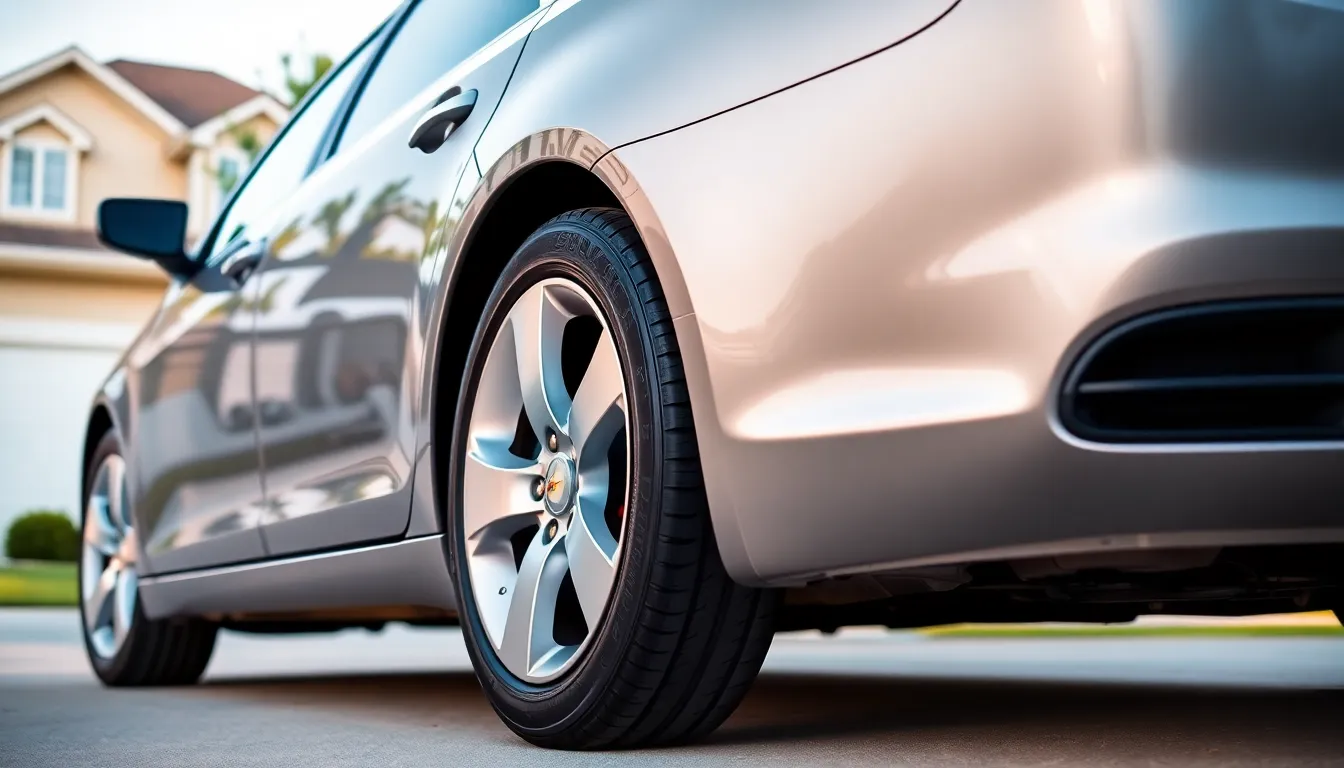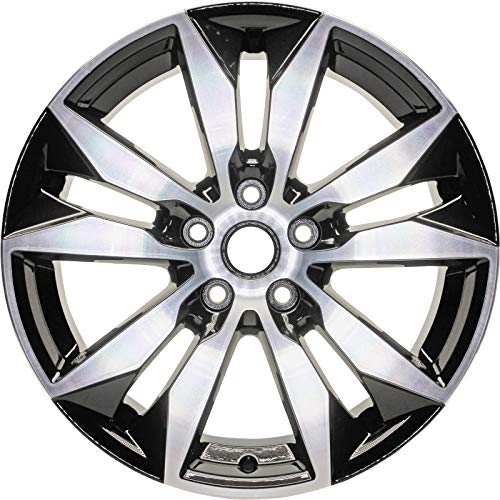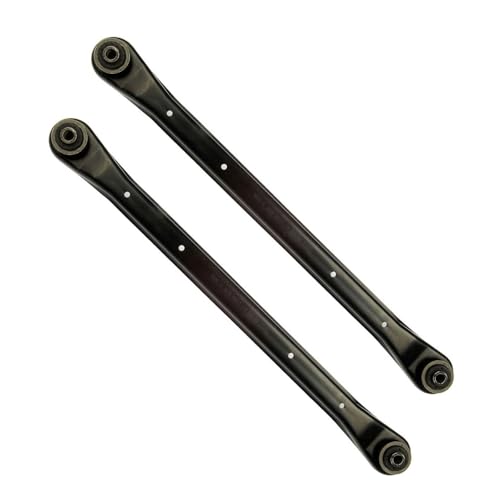Finding the right tire size for your 2011 Chevrolet Malibu shouldn’t feel like solving a complex puzzle. We understand how frustrating it can be when you’re standing in a tire shop or browsing online trying to figure out exactly what your vehicle needs.
Your 2011 Malibu came with exact tire sizes from the factory and knowing these specifications is crucial for maintaining optimal performance safety and fuel efficiency. Whether you’re replacing worn-out tires or considering an upgrade we’ll help you navigate through the options available for your exact model.
Getting the wrong tire size can affect everything from your speedometer accuracy to your car’s handling capabilities. That’s why we’ve compiled comprehensive information about the standard tire sizes recommended load ratings and alternative options that’ll keep your Malibu running smoothly on the road ahead.
2011 Chevrolet Malibu Factory Tire Specifications
The 2011 Chevrolet Malibu comes equipped with exact factory tire specifications that ensure optimal performance and safety. General Motors designed these tire specifications to match the vehicle’s suspension system and handling characteristics perfectly.
Standard Tire Size Options
Most 2011 Chevrolet Malibu models feature 215/60R16 tires as the primary factory specification. This tire size provides an excellent balance of comfort fuel efficiency and performance for daily driving conditions. Base trim levels typically use this 215/60R16 configuration which offers a sidewall height of 129 millimeters and an overall diameter of 26.2 inches.
Higher trim levels including the LTZ variant often come equipped with 225/50R17 tires from the factory. These tires deliver enhanced handling characteristics and a more responsive driving experience compared to the 16 inch options. The 225/50R17 specification features a wider contact patch of 225 millimeters and maintains a similar overall diameter at 25.9 inches.
Some 2011 Malibu models also accommodate 225/55R17 tires as an alternative factory option. This configuration provides slightly more sidewall cushioning than the 225/50R17 while maintaining the 17 inch wheel diameter benefits.
Wheel Diameter Variations
Our research shows that 2011 Chevrolet Malibu models use either 16 inch or 17 inch wheel diameters depending on the trim level and package options. Base LS models consistently feature 16 inch steel wheels with plastic wheel covers or optional 16 inch aluminum alloy wheels. These smaller diameter wheels prioritize ride comfort and typically cost less to replace when tire service becomes necessary.
Mid level LT trim models bridge the gap between comfort and performance with available 17 inch aluminum wheels. The LTZ trim exclusively uses 17 inch wheels which enhance the vehicle’s appearance and provide improved steering response. Performance oriented drivers often prefer the 17 inch wheel setup because it reduces sidewall flex during cornering maneuvers.
| Trim Level | Wheel Diameter | Standard Tire Size | Optional Tire Size |
|---|---|---|---|
| LS | 16 inches | 215/60R16 | N/A |
| LT | 16-17 inches | 215/60R16 | 225/50R17 |
| LTZ | 17 inches | 225/50R17 | 225/55R17 |
Each wheel diameter variation maintains proper speedometer calibration and preserves the vehicle’s original ride height specifications when using factory approved tire sizes.
Performance Impact of Different Tire Sizes
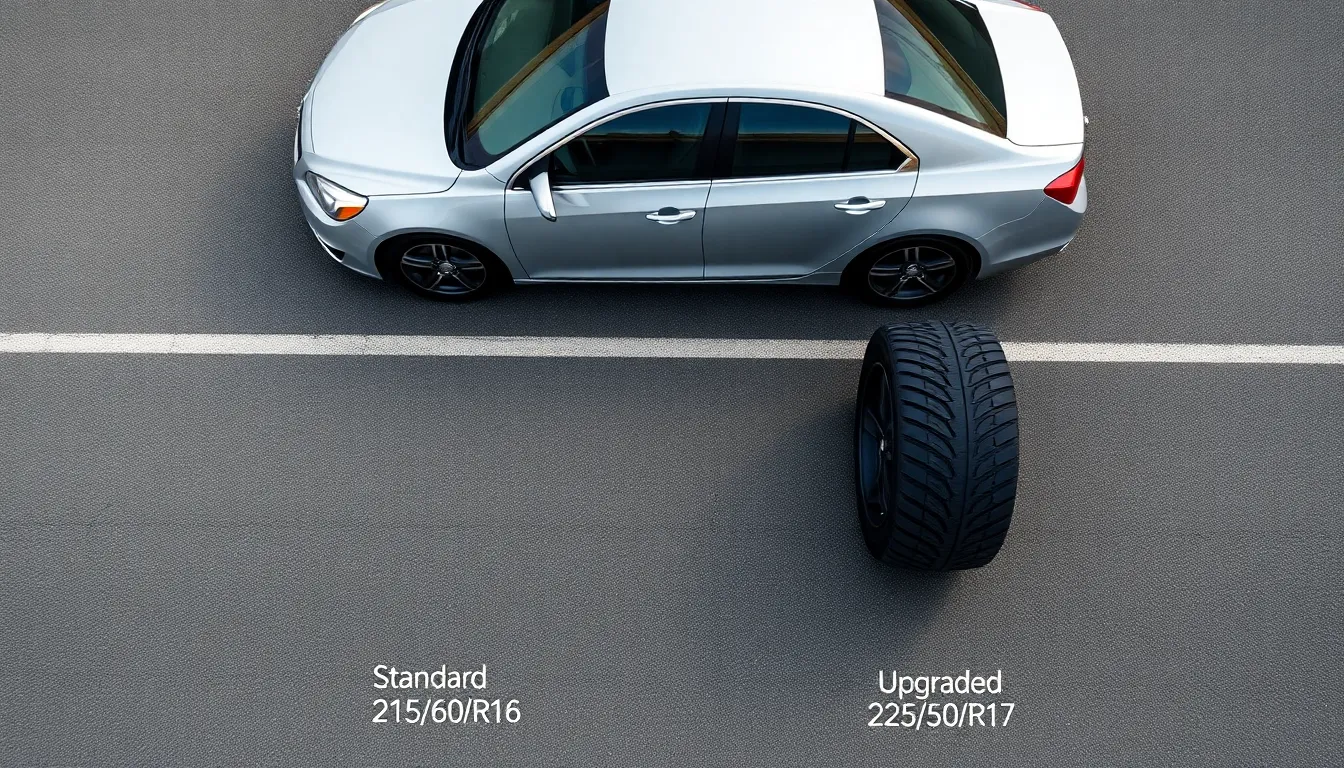
Tire size selections directly affect how our 2011 Chevrolet Malibu performs on the road. Each diameter and width combination creates distinct changes in acceleration response, cornering ability, and overall driving experience.
Fuel Economy Considerations
Larger tire diameters increase rolling resistance and add rotational mass to our Malibu’s drivetrain. The factory-recommended 215/60R16 tires optimize fuel efficiency by maintaining lower weight and reduced road contact resistance. Moving to 225/50R17 tires adds approximately 2-3 pounds per wheel, which decreases acceleration responsiveness and can reduce fuel economy by 1-2 mpg in city driving conditions.
Wider tire profiles create more surface contact with the pavement, generating additional rolling resistance that forces our engine to work harder during acceleration and highway cruising. Our Malibu’s speedometer accuracy also changes with tire diameter variations, potentially affecting actual fuel consumption calculations. Staying within GM’s recommended tire size specifications maintains the optimal balance between performance capabilities and fuel efficiency targets.
Handling and Ride Quality
Lower profile tires like the 225/50R17 option deliver sharper steering response and reduced sidewall flex during cornering maneuvers. These characteristics enhance our Malibu’s handling precision but create a firmer ride quality due to less cushioning between the wheel and road surface. Road irregularities transfer more directly through the suspension system with shorter sidewalls.
Higher profile tires such as the standard 215/60R16 provide better ride comfort by absorbing bumps and road imperfections through increased sidewall flexibility. This tire configuration reduces handling sharpness but improves passenger comfort during daily driving situations. Our Malibu’s electronic stability control and traction management systems calibrate specifically for these stock tire dimensions, ensuring optimal safety performance.
Contact patch size varies significantly between tire widths, with 225mm tires offering approximately 15% more road contact than 215mm options. This increased surface area improves cornering grip but may reduce straight-line acceleration due to higher rolling resistance and additional unsprung weight.
Compatible Aftermarket Tire Options
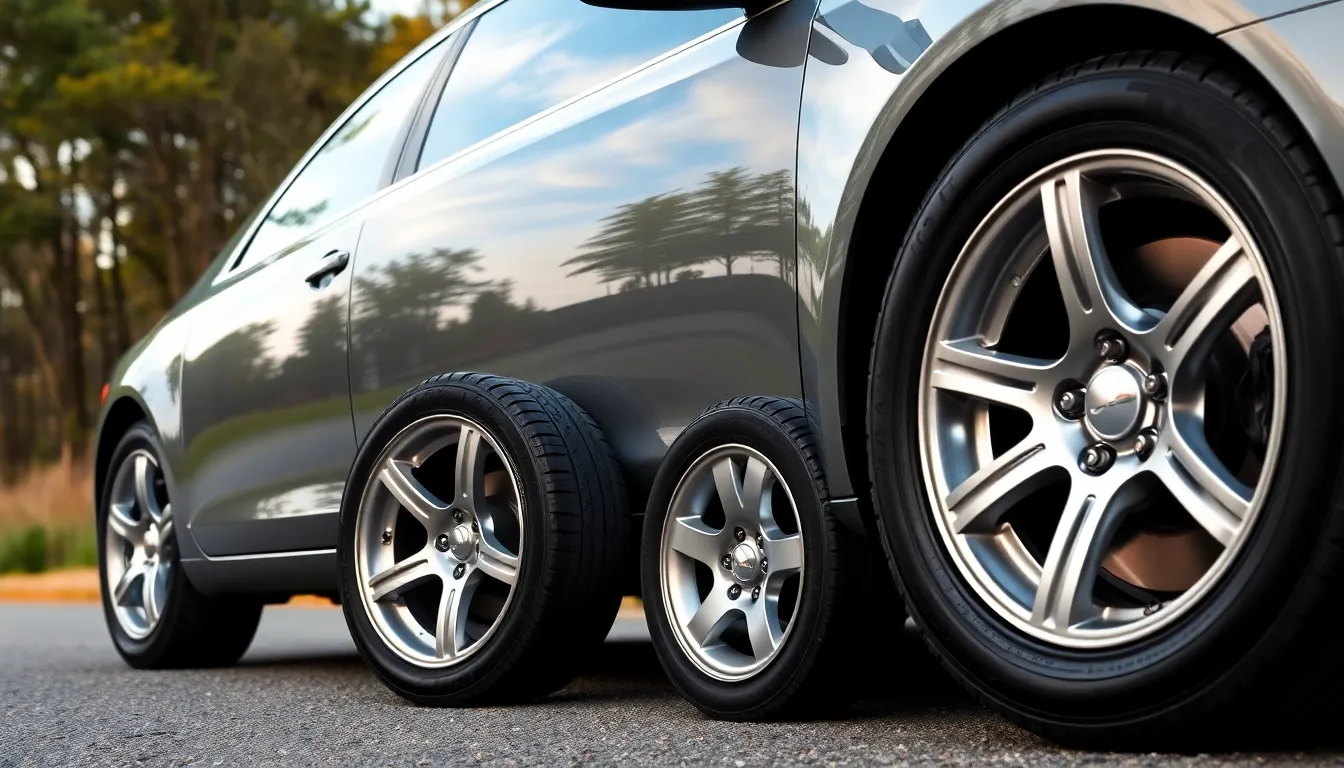
Aftermarket tire selections for the 2011 Chevrolet Malibu expand beyond factory specifications while maintaining proper vehicle performance. We’ve identified several compatible sizes that provide enhanced customization options for different driving preferences and aesthetic goals.
Plus-Sizing Opportunities
Plus-sizing maintains the same overall diameter while increasing wheel size and reducing sidewall height. The 2011 Malibu accommodates several plus-sizing configurations that enhance appearance and handling characteristics.
Upgrading from 215/60R16 to 225/50R17 provides the most popular plus-sizing option for base models. This configuration maintains nearly identical overall diameter while adding visual appeal through larger wheels.
Moving from 225/50R17 to 225/50R18 offers another viable plus-sizing pathway for LT trim owners. Higher trim level vehicles can accommodate this upgrade without compromising fitment or speedometer accuracy.
Advanced plus-sizing options include 245/45R18 and 245/40R19 configurations for enthusiasts seeking maximum visual impact. These larger sizes require careful consideration of load capacity and speed ratings to ensure safety compliance.
| Original Size | Plus-Size Option | Wheel Diameter | Benefits |
|---|---|---|---|
| 215/60R16 | 225/50R17 | 17 inches | Enhanced handling |
| 225/50R17 | 225/50R18 | 18 inches | Improved aesthetics |
| 225/50R17 | 245/45R18 | 18 inches | Maximum grip |
| 225/50R18 | 245/40R19 | 19 inches | Sport appearance |
All-Season vs Seasonal Tire Choices
All-season tires deliver balanced performance across multiple weather conditions throughout the year. These tires excel in moderate climates where extreme temperature variations don’t occur frequently.
Winter tires optimize traction in temperatures below 45°F and provide superior grip on snow and ice. Rubber compounds in winter tires remain flexible in cold conditions while deeper tread patterns enhance snow evacuation.
Summer tires maximize performance in warm weather conditions above 45°F with specialized compounds that grip effectively on dry and wet pavement. These tires sacrifice cold weather capability for enhanced warm weather handling and braking performance.
Seasonal tire rotation between winter and summer options provides optimal performance year-round but requires additional storage space and seasonal changeovers. All-season tires eliminate this complexity while offering adequate performance in most driving conditions.
Regional climate considerations determine the most practical tire choice for each Malibu owner. Northern climates with harsh winters benefit from dedicated winter tire programs while southern regions can rely on all-season or summer tire configurations year-round.
Tire Pressure Recommendations and Maintenance
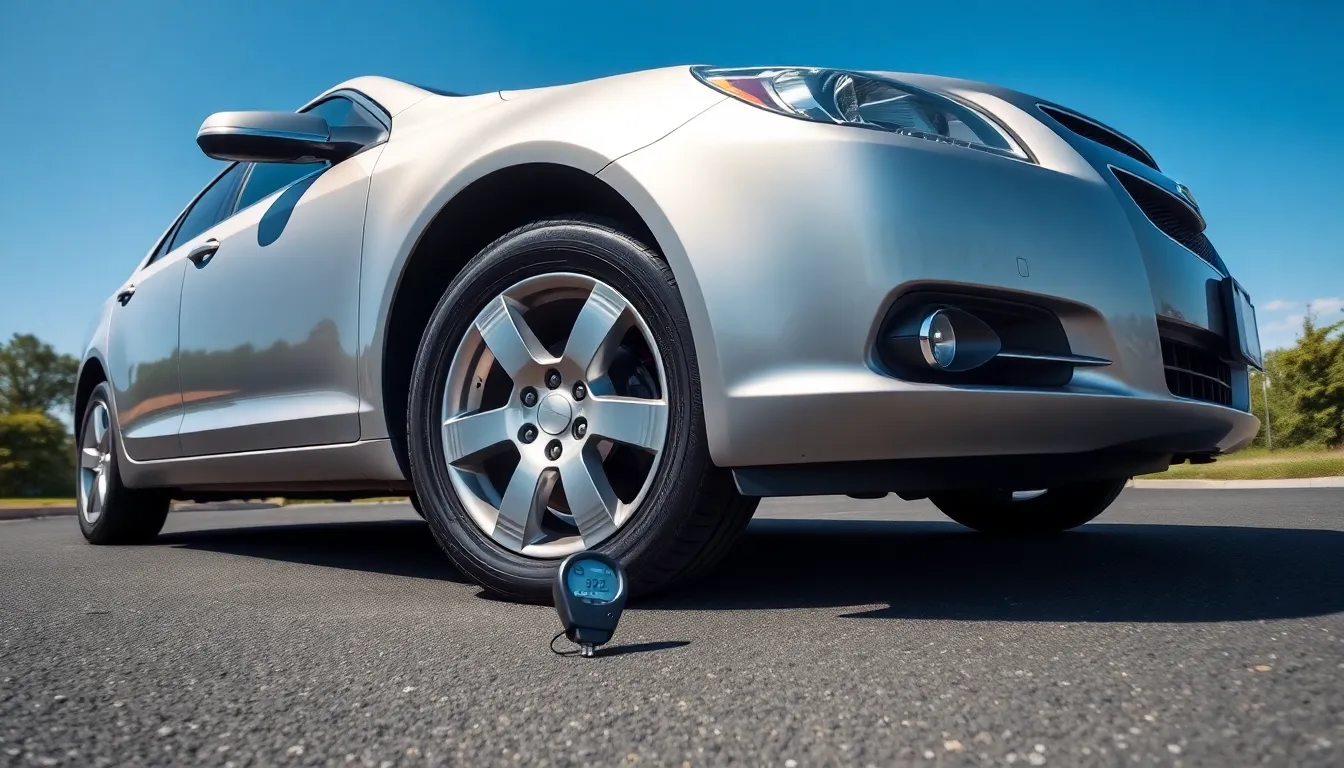
Proper tire pressure directly impacts our 2011 Chevrolet Malibu’s performance and safety. Each tire size requires exact pressure levels to maintain optimal contact with the road surface.
Pressure Specifications by Tire Size
Different tire sizes demand different pressure ranges for our Malibu. We’ve compiled the recommended pressures based on factory specifications:
| Tire Size | Recommended Pressure (PSI) | Load Condition |
|---|---|---|
| 225/50R17 | 36-40 | Normal driving |
| 225/50R18 | 39-43 | Normal driving |
| 225/55R17 | 35-38 | Normal driving |
| 245/45R18 | 40-44 | Performance driving |
Checking tire pressure when tires are cold provides the most accurate readings. Cold tires haven’t been driven for at least three hours or have traveled less than one mile at moderate speeds.
Essential Maintenance Practices
Regular pressure monitoring prevents premature tire wear and maintains fuel efficiency. We recommend checking tire pressure monthly using a quality digital gauge for consistent accuracy.
Tire rotation extends tread life across all four tires evenly. Rotating tires every 5,000 to 8,000 miles distributes wear patterns and maximizes our investment. Front wheel drive Malibus benefit from cross rotation patterns that move rear tires to the front axle.
Visual inspections catch potential problems before they become safety hazards. Examining tires for uneven tread wear indicates alignment issues or improper inflation. Sidewall cracks suggest age related deterioration that requires immediate attention.
Tread depth measurement using a penny test reveals when replacement becomes necessary. Inserting a penny into tread grooves with Lincoln’s head facing down indicates adequate depth when his head remains partially hidden.
Under inflation reduces fuel economy by increasing rolling resistance and generates excessive heat buildup. Over inflation creates harsh ride quality and accelerates center tread wear while reducing the tire’s contact patch with the road surface.
Cost Analysis of Replacement Tires
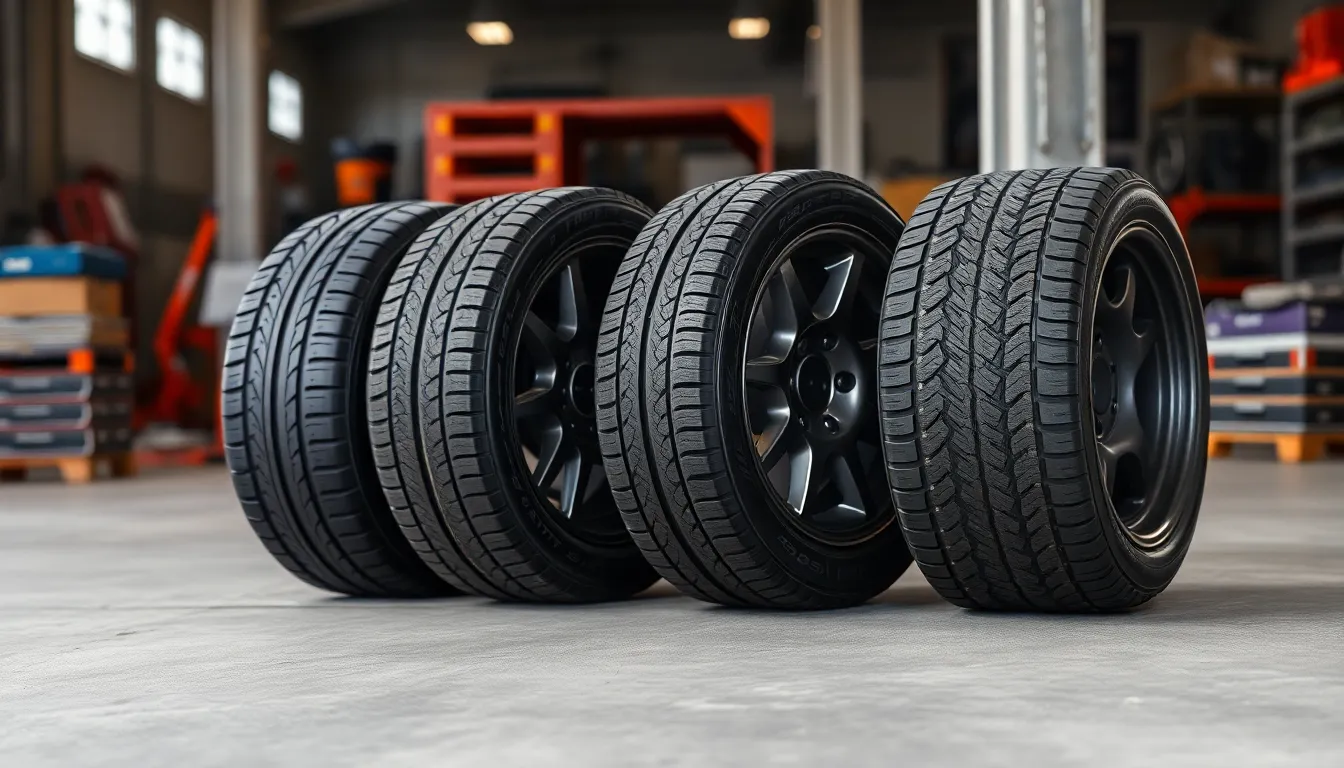
Replacement tire costs for the 2011 Chevrolet Malibu vary significantly based on tire type, brand, and size specifications. Prices typically range from $95 to over $300 per tire depending on the selected brand and features.
Budget-Friendly Options
Utires provides the most economical tire selection for Malibu owners with prices starting at $35.99 and free shipping included. Cost-conscious drivers can find quality replacement tires through Discount Tire’s various promotions and discounted pricing programs. Budget options often include reliable all-season tires that meet basic performance requirements without premium features. Entry-level tire brands typically offer 40,000 to 60,000-mile warranties while maintaining adequate traction and comfort standards. Seasonal sales events frequently reduce budget tire prices by 15-25% during promotional periods.
| Budget Option | Starting Price | Shipping | Warranty Coverage |
|---|---|---|---|
| Utires | $35.99 | Free | 40,000-50,000 miles |
| Discount Tire | Varies | Promotional | 45,000-60,000 miles |
Premium Tire Brands
Michelin leads the premium tire market with exceptional durability and performance characteristics for the 2011 Malibu. Continental offers the ProContact TX model specifically designed for midsize sedans like the Malibu with enhanced wet weather performance. Bridgestone’s Dueler LX tires deliver superior traction and precise handling characteristics suitable for various driving conditions. Premium brands typically cost $200-$300 per tire but provide extended warranties ranging from 70,000 to 100,000 miles. Advanced tire technologies in premium options include reinforced sidewalls, specialized tread compounds, and noise reduction features that justify the higher investment costs.
Installation and Professional Services

Professional installation ensures proper fitment and safety when replacing tires on your 2011 Chevrolet Malibu. We recommend having qualified technicians handle the mounting process since they possess the specialized equipment and expertise to install tires correctly on the 6.5Jx16, 7Jx17, or 7Jx18 rims depending on your trim level.
Essential services include wheel balancing to prevent vibrations and uneven wear patterns. Balancing becomes particularly important when upgrading from 215/60R16 base tires to larger 225/50R17 or 225/50R18 options since weight distribution changes with different tire specifications.
Alignment checks prevent premature tire wear and maintain vehicle handling characteristics. Technicians adjust toe angles, camber settings, and caster measurements to factory specifications during professional installation services.
Mounting procedures involve removing old tires, inspecting rim conditions, and installing new rubber using proper torque specifications. Professional services typically include valve stem replacement to prevent air leaks and ensure long-term reliability.
| Service Component | Importance Level | Typical Duration |
|---|---|---|
| Tire Mounting | Critical | 15-30 minutes per tire |
| Wheel Balancing | High | 10-15 minutes per wheel |
| Alignment Check | Recommended | 30-60 minutes |
| Valve Stem Replacement | Standard | 5 minutes per tire |
Quality installations extend tire life and maintain the performance characteristics designed for your Malibu’s suspension system. Technicians use computerized equipment to achieve precise balance measurements within 0.25 ounces for optimal performance.
Post-installation inspections verify proper bead seating and air pressure settings according to your exact tire size requirements. Professional services guarantee that 215/55R17, 225/50R17, or other compatible sizes meet manufacturer safety standards and performance expectations.
Conclusion
Finding the right tire size for your 2011 Chevrolet Malibu doesn’t have to be overwhelming when you understand the basics. We’ve covered everything from factory specifications to aftermarket options that’ll keep your vehicle running at its best.
Remember that proper maintenance and professional installation are just as important as choosing the correct size. Regular pressure checks and timely rotations will maximize your tire investment and ensure optimal performance.
Whether you stick with the factory 215/60R16 tires or upgrade to 225/50R17 options your Malibu will reward you with reliable performance when you make informed decisions about your tire choices.
Frequently Asked Questions
What is the standard tire size for a 2011 Chevrolet Malibu?
Most 2011 Chevrolet Malibu models come equipped with 215/60R16 tires, which provide an optimal balance of comfort, fuel efficiency, and performance. Higher trim levels like the LTZ typically feature 225/50R17 tires for enhanced handling capabilities.
Can I use different tire sizes on my 2011 Malibu?
Yes, you can use alternative sizes like 225/55R17 or upgrade through plus-sizing options. However, it’s crucial to maintain proper load capacity and speed ratings. Using incorrect sizes can negatively impact speedometer accuracy, handling, and fuel efficiency.
What wheel sizes are available for the 2011 Malibu?
The 2011 Malibu comes with three wheel diameter options: base LS models use 16-inch wheels, mid-level LT models may have either 16 or 17-inch wheels, and the LTZ trim exclusively uses 17-inch wheels.
How do different tire sizes affect fuel economy?
Factory-recommended 215/60R16 tires optimize fuel efficiency, while larger 225/50R17 tires may reduce fuel economy by 1-2 mpg in city driving conditions due to increased rolling resistance and weight.
What’s the difference between all-season and seasonal tires for the Malibu?
All-season tires work well in moderate climates year-round, while dedicated winter tires excel in cold conditions and summer tires perform best in warm weather. Choose based on your regional climate for optimal performance.
What is the recommended tire pressure for a 2011 Malibu?
Tire pressure recommendations vary by tire size and are specified on the driver’s door jamb placard. Always check pressure when tires are cold for accuracy, as proper inflation is crucial for performance, safety, and fuel economy.
How much do replacement tires cost for a 2011 Malibu?
Replacement tire costs range from $95 to over $300 per tire, depending on brand, type, and specifications. Budget options start around $35.99, while premium brands like Michelin typically range from $200-$300 per tire.
Should I get professional installation for my Malibu tires?
Yes, professional installation is recommended for proper fitment and safety. Qualified technicians provide essential services including wheel balancing, alignment checks, and valve stem replacement to ensure optimal performance and tire longevity.

